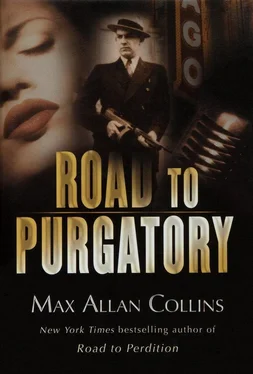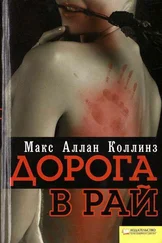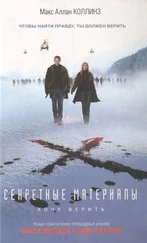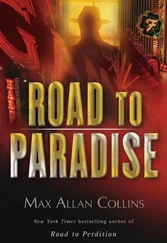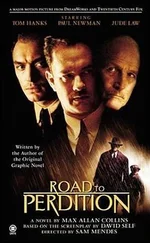“Yes.”
“You have to go in strong, because this is one of those set-an-example deals I was talkin’ about. You ever hear of a guy called Ness?”
“No,” Michael said.
“Think back — it was in all the papers maybe ten years ago, early ’30s.”
“I was just a kid, then. Reading the funnies was my speed.”
Nitti grinned; he had large teeth, very white, and Michael wondered if they were real. “Well, if you was readin’ Dick Tracy , you were close: Ness was one of the feds that got Al on income tax charges; he’s a raider type... likes to bust up and confiscate property. Costly prick. But dedicated and smart.”
“You want me to threaten him? Hurt him?”
“No! Jesus, kid. Settle down.”
Nitti explained to Michael that he’d decided to curtail prostitution activities, to head off Ness’s vice efforts. But Calumet City — the wide-open little town owned by the Outfit, which catered to servicemen and defense plant workers — was going to be a problem.
“Our partners there,” he said, “are kinda cowboys. Whole damn town is like Dodge City or Tombstone or some shit. And I have sent word that the brothels are to be shut down... I’ve made it clear that the strippers can still strip, and can still negotiate fun and games with customers.”
“Isn’t that prostitution, too?”
“Yeah, but untraceable to us. B-girls, hostesses, not a problem. A lotta girls live in Cal City, and can take guys home to their places, what’s the harm, who’s to know? But the out-in-the-open whorehouses, they gotta be shuttered.”
“Which these cowboys don’t want to do?”
Nitti’s smirk was disgusted and humorless. “No. Worst of them is a pipsqueak called Frank Abatte. Owns a dozen clubs in Cal City, with us as silent partners, of course. Does just fine with gambling, so he’ll make do without the broads. Problem is, he thinks he’s the boss of Cal City.”
“You’d like me to point out that he isn’t.”
“If you would, Michael. Now, Abatte’s got his own crew — couple lads called Vitale and Neglia, both killers, and they can be triggerhappy... You sure you’re up for this?”
“Piece of cake,” Michael said.
Louie provided the details, explaining a lot about how Calumet City worked, along the way. The Outfit controlled the town in part because Cal City was in Cook County, but also by political clout. The bartenders, entertainers, taxi drivers, tavern owners, gamblers, prostitutes, strippers, bouncers, and so on all lived right there in Calumet City, the riffraff outnumbering the better element.
But even some of the better element voted along with the riffraff, since the sinful two blocks at the extreme northeastern part of town, nudging the Indiana state line, paid the lion’s share of the city’s taxes by way of high license fees.
This kept property taxes down for those who lived in the neat crackerboxes with well-tended lawns on the intersecting streets of this typical small American town with its city hall, stores, library, and churches. The police? Mostly ex-employees of the joints, who spent their time trying not to run over drunks in the town’s four patrol cars. The number of Cal City saloons: 308. The number of Cal City cops: fourteen.
Night had fallen by the time Michael and Campagna reached Calumet City’s State Street; the sky to the north blazed red, courtesy of the steel mills, which complemented the street’s own scarlet hue, countless relentless neons washing the world garish shades of red and yellow and orange. It was as if the city were on fire, names screaming out of the conflagration: Rainbow, Ron-da-voo, 21 Club, Playhouse, Show Club, Club Siesta, Oasis, Rip Tide .
Wasn’t quite nine and things hadn’t started to hop yet, the sidewalks populated but not thronged; uniforms from every branch of the service could be spotted as well as the rough faces and leather and denim jackets of mill and factory workers.
These were ordinary storefronts that had been converted into saloons and clubs, and most had big picture windows through which the activities within — sometimes a little band tearing it up, or comic telling jokes, but also strippers working runways — could be glimpsed as a come-on.
Michael prowled down the street in the Ford, the electric fire reflected on the windshield and bathing both their faces; finding a parking place here was tougher than downtown Chicago.
Campagna pointed out a spot in front of a fire hydrant, and Michael obediently pulled in.
“We don’t pay any kinda fine in Cal City,” Campagna said, getting out into the neon noon.
Campagna wore a wide-lapeled gray suit, presently orange, and a darker gray fedora, scarlet at the moment. Michael’s dark brown suit, from Marshall Field’s, was a little big for him, to accommodate the nine-millimeter Browning in his shoulder holster; later he’d get something tailored. He wore no hat. He too was tinted orange and red.
Right in front of them, through a window, they could see past the bartender into the club, where over the heads of seated patrons, a pale shapely woman on a behind-the-bar runway was removing her G-string, her pasties already off.
“Must be kinda different for ya,” Campagna said with a knowing chuckle.
They began to walk down the sidewalk, weaving in and out among mostly male strollers. As they moved past one joint after another, various musical styles asserted themselves: honky-tonk; jazz; blues; even polka music... here an accordion, there the mournful wail of a clarinet or earthy moan of a saxophone, country shuffles and stripper-friendly tom-toms courtesy of a succession of low-rent Krupas.
“Different how?” Michael asked.
Campagna snorted a laugh. “Well, you musta never seen the likes of this, before. I mean, they don’t have this kinda fun in DeKalb, right?”
“No they don’t.”
But they did in Manila. And Michael wasn’t terribly impressed by the strident sinning of Cal City. He was a veteran, not only of the war in the Philippines, but of dives with names like the Santa Ana, the Zamboanga, the Circus Club, and the Yellow Den. Joints where Filipina babes were too bored to walk the streets, making the customers come to the bar stools where they sat, and God help the guy who didn’t know these doll-like beauties had been taught to use knives since childhood; a town where even the best hotels had prominent signs saying: FIREARMS ARE PROHIBITED ON PREMISES; PLEASE CHECK GUNS AT DOOR.
Yes, Cal City had wide-open gambling; you could hear the rattle of dice from the street, slot machines, roulette wheels, birdcages, games of poker, right out in the open. But in Manila there was all that plus jai alai and cockfights and the ponies.
“Yeah, Louie,” Michael said, dryly. “Hick kid like me can only say, ‘wow’... Where can we find our friend Frankie Abatte?”
“One of a half-dozen places. You wanna get a steak first?”
“I’d rather eat, after.”
“He might not be in yet; it’s not even nine. This place is barely woke up. Anyway, we oughta chow down before it gets too drunk out, in Cal City. People puking around me takes the edge off my appetite.”
This seeming a good point, Michael followed Campagna to the Capitol Bar and Lounge, which had a fancy awning (CONTINUOUS ENTERTAINMENT!) and occupied a defunct bank that looked vaguely familiar. Maybe he and his father had robbed it. Probably the fanciest joint in town, with a number of well-dressed slumming couples in attendance, the Capitol featured an attractive blonde in a black ball gown who played the organ and sang current hits with a nice smile and pitch that nestled in the cracks of the Hammond.
“What’s the story on Abatte’s boys?” Michael asked.
Both men were eating rare T-bones smothered in grilled onions and mushrooms, with french fries on the side. The blonde was butchering “Blues in the Night.”
Читать дальше
